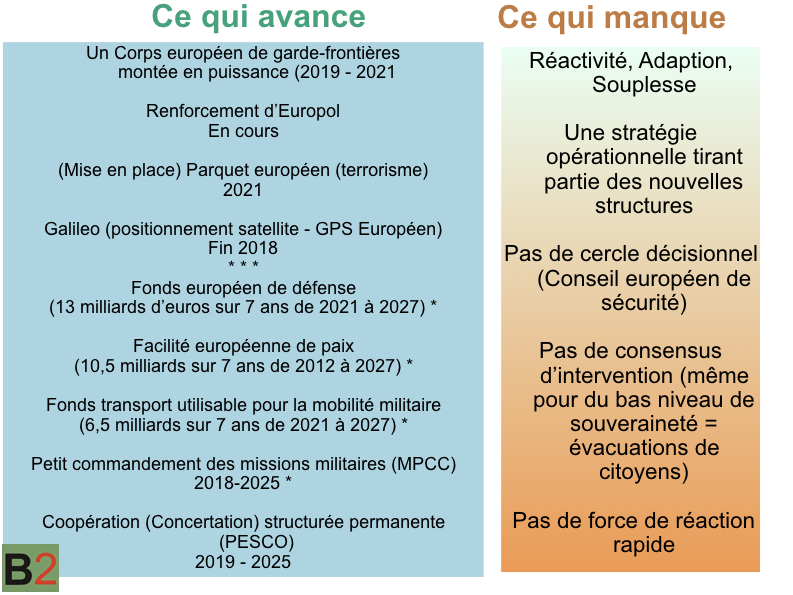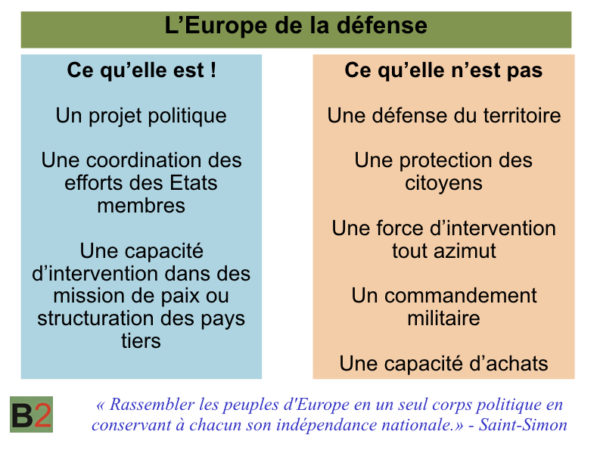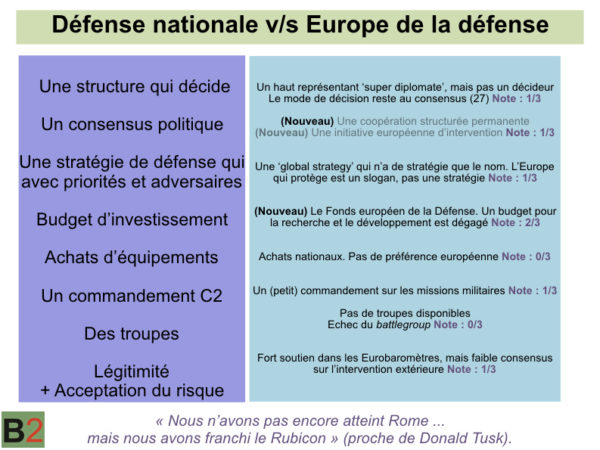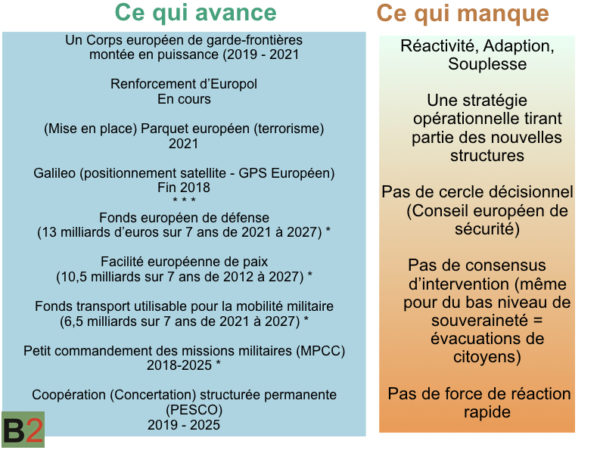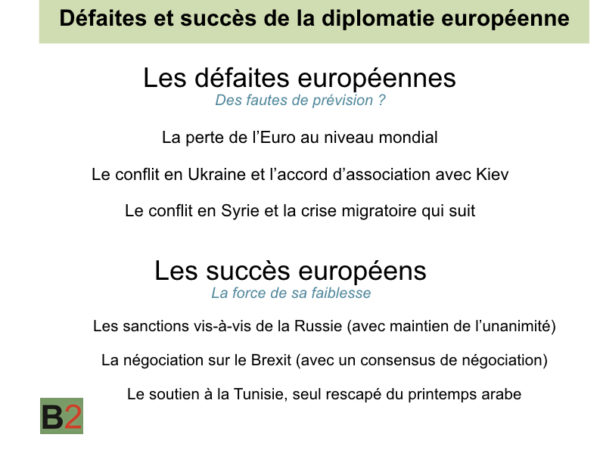What Defense Europe is. What she is not
(B2) While the sea serpent of the European army reappears by the grace of Emmanuel Macron (*), it is not useless to return to earth. What exists today... and what does not exist in terms of defense at European level.

The reality enshrined in the current European Treaties is the Common (European) Security and Defense Policy (PeSDC). Or in common language, the Europe of defence. However, it is not comparable to what is defined at the national level as a defense policy. Whether in the language of pro or anti-European integrations, this aspect is very often erased. However, it is essential to have an 'honest' and 'objective' view of the current situation.
A national defense policy
From a national point of view, a defense policy is defined first of all by an authority which leaves its mark and a short decision-making circuit (as in France with a President of the Republic as the main actor) or longer (as in Germany with a decision of the government, an approval of the parliament). It responds to a defense strategy, which is developed in successive layers, responding to historical antecedents and political logic. It then develops into an investment budget for an army, military equipment, troops, a logic of action and legitimacy in public opinion which accepts, more or less, an internal or external military commitment, risk or not.
Defense Europe: a political project
Defense Europe is first and foremost a political project, which aims to assert Europe's place in the world, at the service of a foreign policy. It does not thus consist in ensuring the defense of the territory or the protection of citizens (despite the political declarations to this effect). It proceeds only from a coordination of the efforts of the Member States. Its decision-making circuit is thus always based, at all stages, from initiative to approval and then to command and control, on an agreement of all the Member States, in a collegial manner. Getting everyone to agree at the same time on a common issue is a real 'challenge'. Its sole objective is to have a limited capacity to intervene in missions or operations for peace or the consolidation of the rule of law. It is therefore not an all-out intervention force, has no direct (national) or integrated (like NATO) military command, nor troops or forces available permanently or on its own. It can only take place outside borders, with the consent of the States concerned (or at least their governments) and of the international community. We are thus very far from the 'fundamentals' of a European army.
When the principles of national defense and those of European defense are thus placed face to face, it is inevitable that the second will be less effective than the first. We can consider that this is a temporary weakness, due to the political personalities of the moment. This may be the case sometimes. But we must not minimize the structural weaknesses due to a main fact: Europe is not a State but a legal and economic structure of consultation and cooperation above all.
If we want to give a more mathematical overview, I have evaluated, in the form of a note – on a scale of 0 to 3 – what points the European Union fulfills, once all the projects mentioned recently have been put in place. We thus go from a mark of 0 to 3 according to the themes: from 0 for the equipment and the forces available to 2 for the research budget, passing by the mode of decision and the political consensus which I rate at 1 out of 3 .
Progress but slow and late
This assessment takes into account certain very recent developments on many points, which are not negligible but do not yet make it possible to fill all the gaps.
At the level of internal security, we can thus note the creation of a European body of border guards, the reinforcement of Europol, the competence given to the future European public prosecutor's office for terrorism or the complete putting into orbit of the Galileo system, a competitor European GPS. Any new features that are not yet fully in place. They will be by 2019-2021.
In terms of defence, we can note the proposals for the creation of a European defense fund, a European peace facility, a transport fund that can be used for military mobility. These proposals still need to be approved and will only really come into force in 2021, with a ramp-up by 2027. To this must be added the permanent structured cooperation, which has been created, but whose real effect will not be will only be felt by 2021-2025, because it is based on a so-called 'phased' approach.
Gaps filled, but not all
So we see it. Some gaps are being filled, but not all. Europe has often lacked responsiveness and adaptation to the various crises. Not only in strategic matters, but also diplomatic or even economic.
Whether it's the financial crisis, the migration crisis, the war in Syria or in eastern Ukraine, the scenario is often the same. Europe seems surprised by an event, gropes for several months (at the very least) then tries one or two solutions, sometimes without success, because the crisis then evolved, to finally find the appropriate means (financial crisis or migration crisis) ... or give up (Syrian crisis). Meanwhile, the damage is profound: economic and social during the financial crisis, ethical and political during the migration crisis.
Defense policy intrinsically linked to foreign policy requires questioning the defeats and successes of European diplomacy.
(Nicolas Gros-Verheyde)
(*) Read : Faced with threats, Macron proposes a European army. An old or a young fantasy?
NB: this article is developed from a short presentation devoted to 'Europe of defense today', at the Entretiens de la Citadelle in Lille on October 25, 2018. The illustrative photo is chosen on purpose, Denmark being the only country in the European Union not to participate in the security and defense policy...
Read also: The Euro struggles to impose itself at the international level
Defense Europe or European Defense
A debate takes place among some observers or officials on the use of this term. Well Named. Because the official term - common security and defense policy - is rather complex to unfold. But I haven't found a more symbolic one. The oft-used term 'European defence' is equally unreal, as there is no 'European defence' in the sense of the European Union. It lends itself to confusion, with the territorial defense of the European continent, embodied by NATO.
